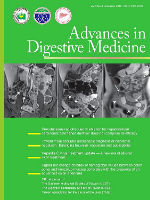
Advances in Digestive Medicine
Scope & Guideline
Transforming Research into Digestive Health Solutions
Introduction
Aims and Scopes
- Clinical Gastroenterology and Hepatology:
Focus on clinical aspects related to gastrointestinal and liver diseases, including diagnosis, treatment, and management strategies for conditions such as hepatitis, cirrhosis, and inflammatory bowel disease. - Endoscopic Techniques and Innovations:
Research on advancements in endoscopic procedures, including therapeutic techniques, safety assessments, and comparative studies of various endoscopic interventions. - Oncology and Digestive Disorders:
Exploration of the relationship between digestive system disorders and cancer, including studies on early detection, risk factors, and treatment outcomes for gastrointestinal malignancies. - Microbiome and Digestive Health:
Investigation into the role of gut microbiota in digestive diseases, their impact on treatment responses, and the emerging field of microbiome-based therapies. - Surgical Interventions and Outcomes:
Analysis of surgical techniques and their outcomes for various gastrointestinal conditions, including studies on complications and postoperative management. - Patient-Centered Care and Nursing Roles:
Emphasis on the importance of nursing and multidisciplinary approaches in the management of gastrointestinal diseases, highlighting patient education and support.
Trending and Emerging
- Impact of Gut Microbiota on Disease:
An increasing number of studies are exploring the relationship between gut microbiota and various digestive disorders, emphasizing the potential for microbiome-targeted therapies and personalized medicine. - Innovations in Endoscopic Techniques:
There is a clear trend towards research on novel endoscopic techniques and their applications, including studies on efficacy, safety, and comparisons between different endoscopic approaches. - Cancer Research in Gastroenterology:
Research focusing on the intersection of gastroenterology and oncology is on the rise, particularly studies related to the early detection, management, and outcomes of gastrointestinal cancers. - Patient Management and Quality of Life:
An emerging focus on the holistic management of patients with digestive diseases, including quality of life assessments, patient education, and the role of nursing in care delivery. - Chronic Liver Disease and Hepatitis C Management:
With ongoing global health challenges, there is a growing emphasis on the management of chronic liver diseases, particularly hepatitis C, including studies on treatment efficacy and patient outcomes.
Declining or Waning
- Traditional Diagnostic Techniques:
There has been a noticeable decrease in studies focusing on conventional diagnostic methods such as barium studies and basic endoscopic procedures, likely due to the rise of more advanced imaging techniques and minimally invasive procedures. - Basic Research on Gastrointestinal Physiology:
Studies centered on fundamental gastrointestinal physiology and anatomy have become less frequent, possibly overshadowed by more applied clinical research and translational studies. - Pharmacological Interventions for Digestive Disorders:
Research on traditional pharmacological treatments for digestive diseases is waning, as there is a growing emphasis on personalized medicine and innovative treatment modalities such as biologics and gene therapy.
Similar Journals
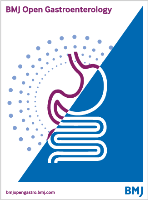
BMJ Open Gastroenterology
Empowering Global Insights in Gastrointestinal MedicineBMJ Open Gastroenterology is a premier open access journal published by the esteemed BMJ Publishing Group, focusing on the dynamic and evolving field of gastroenterology. Established in 2014, the journal has rapidly ascended in stature, reflected in its impressive 2023 Q1 ranking in gastroenterology and its position within the top 25% of journals in the category according to Scopus. With a mission to disseminate high-quality, peer-reviewed research with global significance, the journal provides a vital platform for researchers, professionals, and students alike to share their findings and advancements in gastrointestinal medicine. Operating from its headquarters in London, England, the journal's open access format ensures wide visibility and accessibility of cutting-edge research, making it an invaluable resource for those dedicated to improving patient care and driving innovation in gastroenterological sciences. By engaging with this journal, contributors and readers can stay at the forefront of critical developments in the field, fostering a collaborative environment for knowledge exchange.
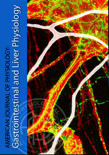
AMERICAN JOURNAL OF PHYSIOLOGY-GASTROINTESTINAL AND LIVER PHYSIOLOGY
Pioneering Research for a Healthier Digestive SystemAmerican Journal of Physiology-Gastrointestinal and Liver Physiology, published by the American Physiological Society, stands as a leading journal in the domains of gastroenterology, hepatology, and overall physiology. With an impressive impact factor and consistent ranking in the Q1 quartile across multiple categories, this journal provides a vital platform for disseminating advanced research and innovative findings related to gastrointestinal and liver physiology. Since its inception in 1980, the journal has fostered a community of researchers and clinicians dedicated to understanding and improving digestive and liver health. While maintaining a traditional subscription model, it ensures high-quality peer-reviewed content that is crucial for informed professional practice and academic inquiry. The journal’s Scopus ranks highlight its significant impact in the fields of gastroenterology and hepatology, making it an indispensable resource for academics and practitioners alike, eagerly exploring both foundational and cutting-edge topics in physiology.

Gastrointestinal Disorders
Unlocking Knowledge in Gastrointestinal Disorders for AllGastrointestinal Disorders is a prominent open-access journal published by MDPI, based in Switzerland, that focuses on the latest research and innovations in the fields of gastroenterology, hepatology, and immunology. Since its inception in 2019, the journal has provided a vital platform for researchers and professionals to disseminate their findings, engaging with a global audience keen on advancing knowledge in gastrointestinal health. With a dedicated commitment to high-quality, peer-reviewed articles, Gastrointestinal Disorders has gained recognition in 2023, achieving Q3 status in gastroenterology and notable rankings in several other categories, including a respectable position in the quartiles for hepatology, immunology, and oncology. Despite its recent establishment, the journal has quickly become a valuable resource, facilitating open access to critical insights in the study of gastrointestinal diseases and their management, ensuring that emerging research is readily available to inform clinical practice and educate future professionals.

Digestive Endoscopy
Transforming Knowledge into Clinical PracticeDigestive Endoscopy is a premier journal dedicated to publishing high-quality research in the fields of gastroenterology and radiology. Published by WILEY, this esteemed journal has established itself as a vital resource since its inception in 1989, continuing to thrive in its pursuit of advancing knowledge and practice in digestive health. With an impressive impact factor reflected by its Q1 ranking in both Gastroenterology and Radiology, Nuclear Medicine and Imaging, Digestive Endoscopy stands out as a crucial platform for researchers, practitioners, and students alike. The journal's commitment to disseminating cutting-edge findings and its strategic goal to enhance clinical practice make it indispensable for those engaged in these dynamic fields. While Open Access options are not currently available, the journal remains widely accessible through institutional subscriptions and various research databases. The Scopus rankings further underscore its significance, placing it in the top tiers of its categories, highlighting its influence and the relevance of its contributions to the global medical community.
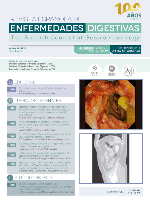
REVISTA ESPANOLA DE ENFERMEDADES DIGESTIVAS
Advancing the frontiers of digestive health.REVISTA ESPANOLA DE ENFERMEDADES DIGESTIVAS, a pivotal Open Access journal published by ARAN EDICIONES, S A, has been at the forefront of advancing the field of gastroenterology since its inception in 1990. With a robust commitment to disseminating high-quality research, the journal provides a platform for researchers, clinicians, and students to share innovative findings and insights concerning digestive diseases. The journal is characterized by its Q3 ranking in both Gastroenterology and Miscellaneous Medicine categories, indicative of its significant contributions to these fields, and is positioned within the 36th percentile of Scopus rankings for medicine related to gastroenterology. Based in Spain, REVISTA ESPANOLA DE ENFERMEDADES DIGESTIVAS has embraced the Open Access model since 2004, ensuring that its articles are readily available to a global audience without financial barriers. The journal not only supports academic discourse but also plays a crucial role in improving clinical practices and health outcomes related to digestive health.

Clinical Gastroenterology and Hepatology
Advancing the Frontiers of Gastroenterology and HepatologyClinical Gastroenterology and Hepatology, published by Elsevier Science Inc, stands as a leading journal in the fields of gastroenterology and hepatology. With an ISSN of 1542-3565 and an E-ISSN of 1542-7714, this esteemed publication has earned its place in the top quartile (Q1) of both gastroenterology and hepatology categories as of 2023, ranking 6th out of 167 and 7th out of 82 respectively. The journal aims to disseminate innovative research, clinical studies, and case reports that advance the understanding and treatment of gastrointestinal and liver diseases. Targeted towards researchers, healthcare professionals, and students, it provides crucial insights into emerging therapies and medical advancements. Clinical Gastroenterology and Hepatology is not only a pivotal resource for contemporary gastroenterological research but also fosters collaboration and knowledge-sharing within the medical community. With a converging publication history from 2003 to the present, the journal continues to build on its solid foundation of scientific excellence and relevance.

Minerva Gastroenterology
Advancing Gastroenterology Through Innovative ResearchMinerva Gastroenterology, published by EDIZIONI MINERVA MEDICA, is a notable academic journal dedicated to advancing the field of gastroenterology and related disciplines. With an ISSN of 2724-5985 and an E-ISSN of 2724-5365, this journal gathers innovative research from diverse areas including internal medicine, endocrinology, and metabolism. Though characterized by its open-access policies, Minerva Gastroenterology aims to provide a platform for high-quality scholarly articles with an emphasis on critical reviews, clinical studies, and translational research. Since its inception in 2021, the journal has managed to secure a reputation reflected in its Q3 rank across multiple categories in 2023, as well as its standing in Scopus rankings, positioning it in the 45th to 47th percentile among renowned medical journals. Situated in Turin, Italy, it fosters collaboration and knowledge-sharing among researchers and practitioners, making it an essential resource for those seeking to deepen their understanding of gastroenterological conditions and enhance clinical practices.
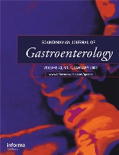
SCANDINAVIAN JOURNAL OF GASTROENTEROLOGY
Exploring Innovations in Gastroenterology Since 1966SCANDINAVIAN JOURNAL OF GASTROENTEROLOGY, published by Taylor & Francis Ltd, is a leading journal in the field of gastroenterology, dedicated to advancing clinical and experimental research related to digestive health. With an ISSN of 0036-5521 and an E-ISSN of 1502-7708, this journal provides a platform for high-quality research that addresses the complexities of gastrointestinal diseases. Since its inception in 1966, the journal has consistently contributed valuable insights and is currently categorized in the Q2 quartile of gastroenterology journals, reflecting its impact and relevance in the field, with a Scopus rank of 87 out of 167 in Medicine - Gastroenterology. Researchers and practitioners are encouraged to explore the journal's archives to enhance their understanding and stay abreast of innovative strategies for managing gastrointestinal disorders. The SCANDINAVIAN JOURNAL OF GASTROENTEROLOGY remains a crucial resource for those committed to improving patient outcomes through rigorous scientific inquiry and the sharing of impactful findings.

Clinical and Experimental Gastroenterology
Elevating the standard of care through groundbreaking research.Clinical and Experimental Gastroenterology is a prestigious Open Access journal published by DOVE MEDICAL PRESS LTD, dedicated to advancing the field of gastroenterology through rigorous research and innovative insights. With its ISSN 1178-7023, the journal has established a significant presence since its inception in 2008 and has been actively contributing to the academic landscape from New Zealand. The journal has attained a commendable Q2 rank in the Gastroenterology category as of 2023, placing it in the upper-tier percentile of similar journals. It currently ranks #57 out of 167 in the Scopus database, highlighting its relevance and impact in the field at the 66th percentile. Encompassing a wide range of topics within gastroenterology, the journal aims to foster discussion and disseminate findings that enhance clinical practices and patient care. Researchers, healthcare professionals, and students alike will find this journal an invaluable resource for cutting-edge research and developments in gastrointestinal health.
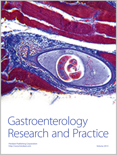
Gastroenterology Research and Practice
Elevating Standards in Gastrointestinal ResearchGastroenterology Research and Practice is a leading Open Access journal dedicated to advancing the field of gastroenterology and hepatology. Published by HINDAWI LTD, this journal offers a platform for researchers, clinicians, and healthcare professionals to share their findings and insights on cutting-edge topics in digestive health. With an ISSN of 1687-6121 and an E-ISSN of 1687-630X, it has established its significance within the academic community, evidenced by its ranking in the 2023 Scopus metrics, where it is positioned in the third quartile for both gastroenterology and hepatology disciplines. The journal is recognized for disseminating high-quality, peer-reviewed articles that contribute to the understanding of gastrointestinal disorders, therapeutic advancements, and innovative practices. Since its inception as an Open Access journal in 2008, Gastroenterology Research and Practice has removed barriers to access, ensuring that vital research reaches a global audience. This ongoing commitment to increasing accessibility, alongside its continuous publication from 2009 to 2024, underscores its importance as a resource for the academic and clinical communities striving to improve patient outcomes in digestive diseases.